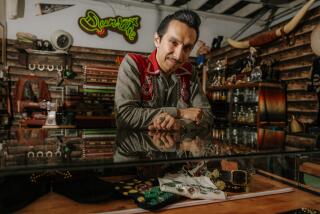Jeans in their purest form
- Share via
Matt Baldwin is running a bit late.
But, hey, he’s a busy guy, one of the latest in a long line of entrepreneurs to put his leather stamp on the back of a pair of blue jeans.
On a quest to bring something more authentic to America’s enduring indigo staple, he launched Baldwin Denim as a men’s line three years ago and added women’s apparel just last season. Now the jeans have landed big, sold across the country at prestige retailers and online vendors from Barney’s to Shopbop. Jay-Z wore a camo style courtside at his beloved Brooklyn Nets’ opener. And in March, Baldwin was named one of GQ magazine’s four Best New Menswear Designers in America, with an upcoming collaboration slated to hit Gap stores in October.
It’s the kind of fashion trajectory you’d expect from a designer in New York or Los Angeles, where a lot of his fellow denim speculators roost — the city of J Brand and Joe’s.
But Matt Baldwin is late on this rainy day because he’s just come from checking out the space for a new Baldwin store, in Kansas City, Mo. — his adopted hometown and, for 10 years, his base of operations.
“I like that it’s unexpected, that it’s little bit it of a contradiction,” the 35-year-old Wichita, Kan., native says of his locale. “We’re able to operate a little ‘off the grid’ and at the same time be connected to the industry and what’s going on.”
Yes, his jeans are made entirely in Los Angeles, where there is a vast production expertise, like many of the designers in the premium denim market — defined as about $200 a pair, give or take. Yes, he has a degree in apparel manufacturing from the Fashion Institute of Design and Merchandising in L.A. And, yes, denim is his holy grail.
But after sojourns in Colorado, Huntington Beach and L.A., he got back to his Midwest roots in 2003, moving to Missouri and opening what’s now a women’s boutique called Standard Style. His interest in designing his own denim grew from his experience as a retailer.
“I wanted to do something, from my perspective, in its purest form,” he says about starting Baldwin Denim. “There was a specific need in denim in the market; something clean, something modern, something timeless.”
Baldwin’s flagship men’s outpost, a modernist interloper in suburban Leawood, Kan., reflects his precise but casual aesthetic with its sleek walnut and blackened-steel store fixtures. Flanking the entry, row upon row of unfaded or “dry” denim jeans are stacked in dark wood cubbyholes.
Customers get a salute with a wall on the other side of the entry where an oversize grid displays nine pairs of Baldwin jeans in various states of well-worn glory, each one a testament to the individual owner who “retired” his jeans for what Baldwin calls the shop’s “inspiration board.”
“All of our washes are based on our customers breaking in our dry denim, and then we are taking them to the wash houses and replicating them,” he explains.
He also favors slightly weightier unalloyed denim in the 12- to 14-ounce range rather than the typical 8- to 10-ounce range often seen in European brands that also often incorporate a lot of stretch and grow “gummy” over time.
“When you pick it up, you can just feel the quality, you can feel the difference in the fabric,” Baldwin says.”Everybody in the shop hems, that’s one of our ‘cultural’ prerequisites,’” he points out. There’s also a darning machine to repair ripped jeans with woven threads rather than patches.
GQ certainly took note of the store’s singularity as part of his appeal.
“Baldwin’s collection started with the perfect pair of jeans, and he uses his stores in Kansas City as laboratories to interact directly with customers. His painstaking attention to detail shows through in his clothing,” says Jim Moore, the magazine’s creative director. “At GQ, we believe he’s ready to become one of the country’s biggest menswear talents.”






